 |
Picks is a monthly sampling of Japan's art scene, offering commentary by a variety of reviewers about exhibitions at museums and galleries in recent weeks, with an emphasis on contemporary art by young artists. |
 |
 |
|
|
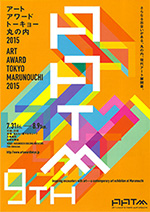 |
|
| Art Award Tokyo Marunouchi 2015 |
| 31 July - 9 August 2015 |
Marunouchi Building Marucube
(Tokyo) |
 |
| Showcasing works by art-school grads selected from applicants nationwide, Art Award Tokyo has been taking place every May in the Gyoko-dori Underground Gallery beneath the downtown Marunouchi district. This year it moved to the first floor of the Marunouchi Building and a midsummer schedule. By displaying the works on temporary walls in a busy open space, the new venue ensured that large numbers of people could view them close-up. Though paintings predominated, they rarely appeared in isolation, as many artists combined them in installations with video images and solid objects. |
|
|
 |
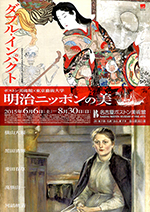 |
|
| Museum of Fine Arts, Boston and Tokyo University of the Arts: Double Impact - The Art of Meiji Japan |
| 6 June - 30 August 2015 |
Nagoya/Boston Museum of Fine Arts
(Aichi) |
 |
| Dipping into the collections of Boston's premier art museum and Japan's most prestigious art school, this show offered an excellent opportunity to see, through painting and sculpture, how the modern West viewed Japan and vice-versa. Once again we are reminded what a unique and fascinating era the Meiji was, marking as it did the first close encounter between these disparate art worlds. |
|
|

|
 |
 |
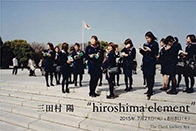 |
 |
| Akira Mitamura: Hiroshima Element |
| 21 July - 8 August 2015 |
The Third Gallery Aya
(Osaka) |
 |
| For about ten years, Mitamura visited Hiroshima once a month to shoot pictures. But rather than focus on the famed monuments to and vestiges of the atomic bomb in the regional metropolis, he wandered aimlessly through its streets -- placing himself at the city's disposal, as it were, yet seeing it through what is indubitably a photographer's, not a tourist's, eye. |
|
|
 |
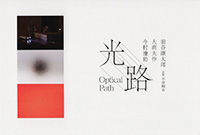 |
 |
| Optical Path |
|
25 July - 8 August 2015 |
Sai Gallery
(Osaka) |
 |
| In this group show by photo/video artists Ryosuke Imamura, Daisaku Oozu, and Kotaro Maetani, all three presented self-referential works that used light from windows to explore the videographic elements of time, framing, and light as object. Maetani's womb was shot from the window of a train on downtown Osaka's Kanjo Line through the lens, covered with red drawing paper, of a camera obscura made by the artist himself. |
|
|
|
|
|
|
|

|
 |
 |
|
 |
 |
| The Prolific World of Togo Murano |
| 11 July - 13 September 2015 |
The Meguro Museum of Art, Tokyo
(Tokyo) |
 |
| An exhaustive display of models of buildings by Togo Murano, one of Japan's foremost architects. One can't help comparing the cluttered layout with the spaciousness of the concurrent Oscar Niemeyer exhibition at the Museum of Contemporary Art Tokyo. Still, the rich variation in Murano's structures inspires admiration. Since one looks down on these models from above, the shapes of his penthouses are especially intriguing. |
|

|
 |
 |
 |
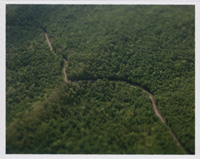
|
|
| Naoki Honjo: Plastic Nature |
| 30 July - 12 September 2015 |
Nap Gallery
(Tokyo) |
 |
| Located inside 3331 Arts Chiyoda, a former school turned art center in downtown Tokyo, Nap Gallery has reopened in a different room in the same building. Inaugurating the new space was an exhibition of new works by photographer Honjo. Known for making real land- and city-scapes look like plastic miniatures, this time he applied his technical magic to mountains and forests shot from high above. With a diffuse focus and no people or manmade features to provide frames of reference, the land surfaces appear abstract and undifferentiated. |
|
|
 |
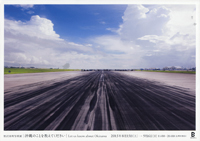 |
 |
Ari Hatsuzawa: Let Us Know about Okinawa |
15 August - 6 September 2015 |
B Gallery
(Tokyo) |
 |
| Over the course of Hatsuzawa's career to date, he has photographed Baghdad in the midst of the Iraq War, northeastern Japan in the wake of the 2011 earthquake and tsunami, and North Korea, where he stayed for a lengthy period. All of these works have appeared in photo exhibitions and published collections. His latest series, shot during the year and three months he spent in Okinawa starting in late 2013, reinforces the impression that he is drawn to locales when they are at their most newsworthy. |
|
|
|
|
|
|
 |
 |
| Art Deco In Residence: Looking at Architecture 2015 + Art Deco Collectors |
| 18 July - 23 September 2015 |
Tokyo Metropolitan Teien Art Museum
(Tokyo) |
 |
| Housed in a mansion built by an imperial prince in 1933, the recently renovated and reopened Teien Art Museum is itself an art-deco masterpiece. This show cleverly integrated the building into an exhibition of art-deco works acquired by various collectors, among them Adolphe Mouron Cassandre's Au Bucheron, owned by Ruki Matsumoto; René Lalique's Galatee, courtesy of Seiichiro Ohmura; and furniture from the Ise Foundation. But what made the occasion special was that the museum allowed visitors free rein to photograph the interior. |
|
 |
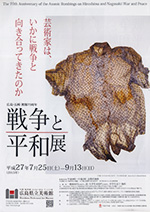 |
 |
| The 70th Anniversary of the Atomic Bombings on Hiroshima and Nagasaki: War and Peace |
| 25 July - 13 September 2015 |
Hiroshima Prefectural Art Museum
(Hiroshima) |
 |
| Some 170 paintings, prints, photographs and sculptures traced the responses of art to modern warfare from the Napoleonic Wars of the early 19th century through the two World Wars of the 20th and on to the present. Up until World War II the exhibition was dominated by Western works, while the war's aftermath was represented by photographic and other renderings of the horrific effects of the atomic bombings, as well as paintings portraying personal war experiences. Strangely, though, the show overall left one with an unnerving impression of the unreality of war art. |
|
|
|
|
 |
|